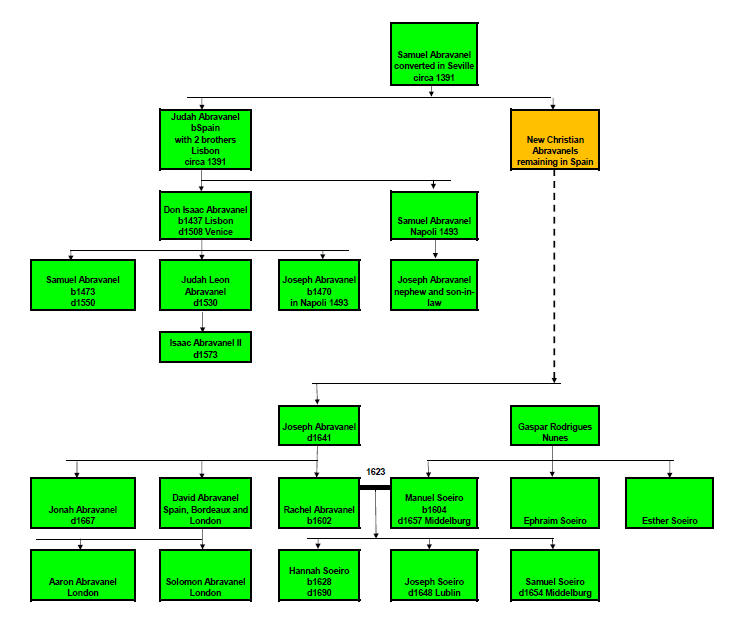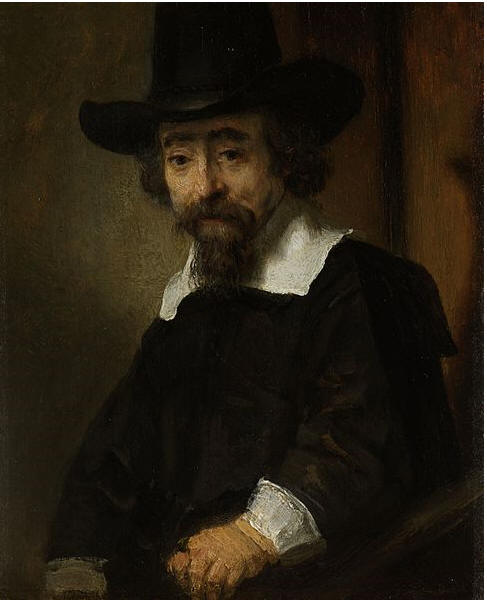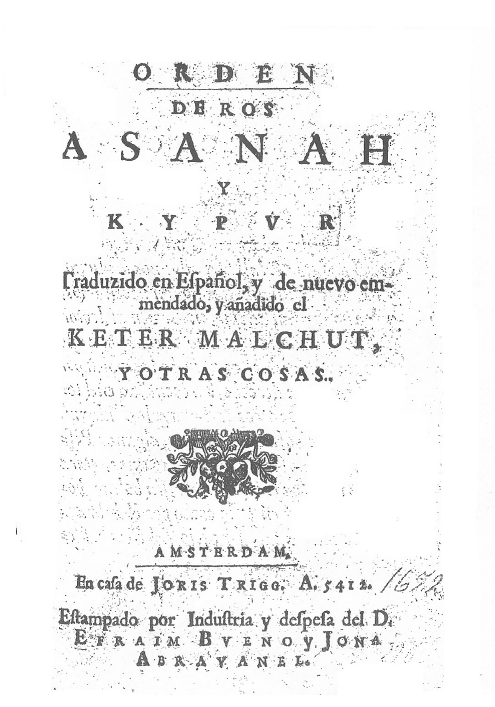

Tony Harding explored the linkage between the Abravenel and the Soeira families which was a key element in the London Jewish Resettlement
In Spain the Jewish Abravanels were rent asunder by a family schism. Thus around the time of the severe anti-Jewish violence in Seville in 1391, Samuel Abravanel converted to Christianity and the family split with at least 3 sons moving to Portugal where for many generations being Jewish was less risky in practice with anti-Jewish laws for a time especially under Joao 1 not being rigorously enforced (ref 136). The Portugal Abravenels did not convert but Isaac left Portugal for Spain 1483 due to suspicions of Joao 2 that Abravanel was involved with the Duke of Braganza in a plot against him. In Spain he became a financier and adviser to Ferdinand and Isabella and was able to rebuild his wealth for he incurred great losses in fleeing Portugal. He is credited with participating in the financing of Columbus' voyages. In 1492, King Ferdinand, in an attempt to persuade Abravanel not to leave, ordered the kidnapping of his grandson. Learning of this plot, Don Isaac and his son Judah (the boy's father) had the grandson Isaac sent to safety in Portugal. Unfortunately, Portugal soon became closed to Jewish travel and the boy was never again seen by his family (ref 55). So in 1492, Don Isaac Abravanel left Spain for Naples, by one account with fortune essentially intact (ref 49 - but ref 136 suggests much was left behind). A brief account of the time in Naples can be found in ref 72 p279 but ref 136 is more complete. Abravanel spent the last 5 years of his life in Venice having moved to Naples in 1492 and then Monopoli a Venetian port around 1495 where he contemplated a move to Salonika. The questions here is - how was David Abravanel related to Don Isaac Abravanel?
Manuel Martinez Dormido (his
Jewish name was David Abravanel) was
born in one of the principal cities of Andalucia in southern Spain, where he
held the offices of alderman and life-treasurer of the customs and of the royal
revenues. Clearly born a New Christian, it is hard to see how
he could be a descendant of Don Isaac. The main alternatives seem to be whether (as shown above) he was a descendant of the original tax-farming New Christian Abravanels
who remained in Spain, or whether he was a descendant of the Abravanels who were
baptised in 1497 in Portugal and then after 1580 some of whom made their way to
Spain (or perhaps he was descended from both lines).
Edgar Samuel
suggested that Inquisitional records might provide details of this ancestry, for
David Abravanel was imprisoned for five years (1627-32) by the
Inquisition, and tortured, together with his wife and sister. On his release he
went to
In the chart is Ephraim the brother and business partner of Menasseh ben Israel, not to be confused with Ephraim the doctor who tended both Menasseh ben Israel and his son Samuel in their dying days (see portait below). We (following Lucien Wolf) show David Abravanel as the brother-in-law of Menasseh ben Israel, though this point is perhaps not certain (for ref 123 p409 - while acknowledging the possibility that Menasseh's wife Rachel was a relative of David Abravanel - observes that Cecil Roth pointed out the lack of evidence supporting Lucien Wolf's assertion that David Abravenel was a brother-in-law or any relation of Menasseh ben Israel!). David Abravanel was accompanied to London by two sons Solomon and Aaron (ref 123 p410). There is mystery about how the Abravanels relate to the later English Prime Minister Benjamin Disraeli via the Lindos, but we refrain from entering this controversy. And there were Abravanels in the West Indies - in the Barbados of 1680 according to Wilfred Samuel - and also in 1692 Jamaica there was a Phineas Abarbanel who was one of the successful petitioners for endenization; but we have not managed to link them to the present story.
 |
 |
||||
| Dr Epraim Ezekiel Bueno 1599-1665 painted by Rembrandt van Rijn in about 1647. Ephraim Bueno was a member of the community at the time of the excommunication of Baruch Spinoza. Rembrandt was a neighbour and an observer of the Sephardic Jews of Amsterdam. | Both the Soeira and Abravanel families in Amsterdam had printing businesses (particularly for religious texts). Menasseh ben Israel passed his onto his son Joseph, while Jonah Abravenel operated his jointly with Dr Ephaim Bueno. |